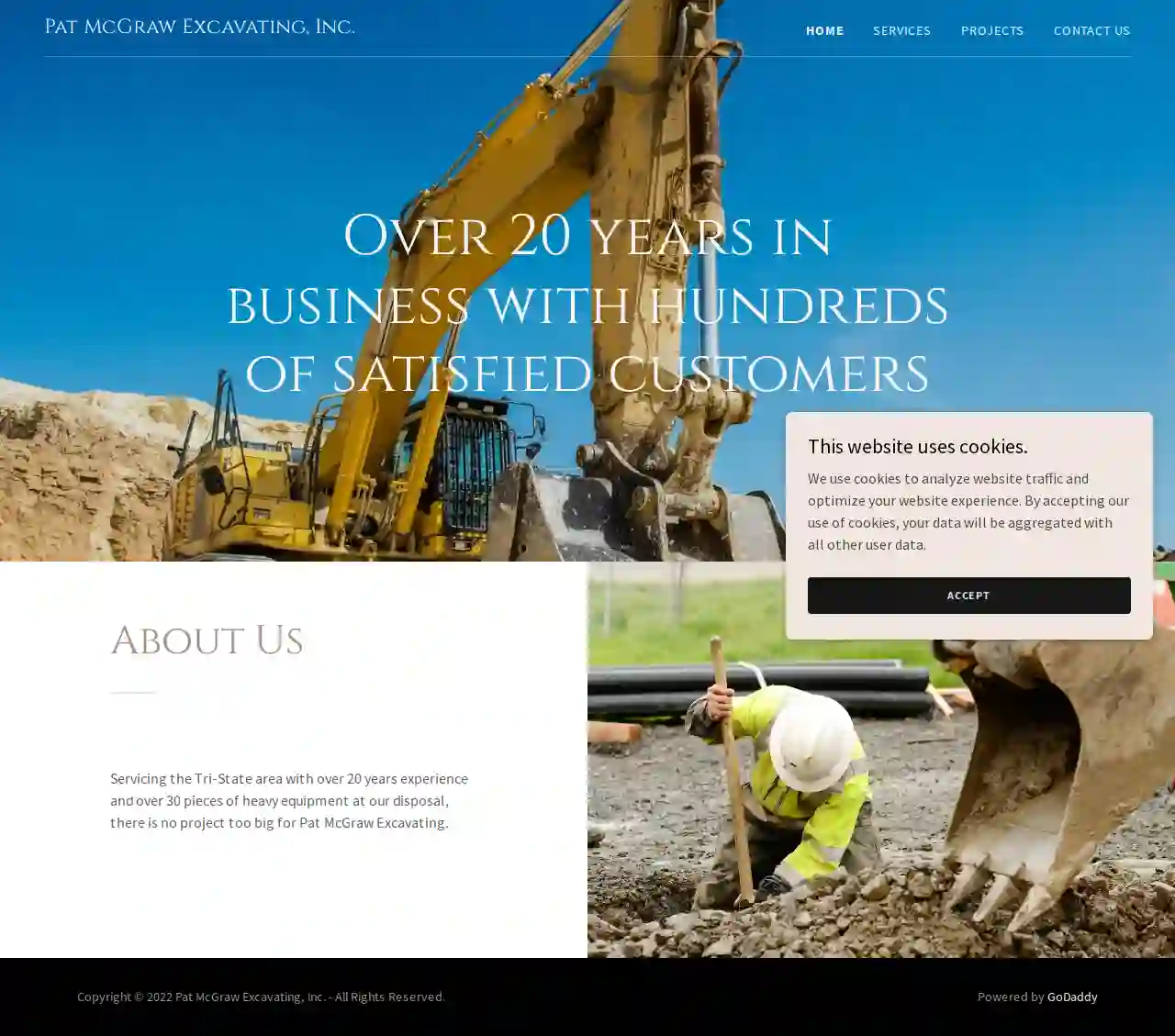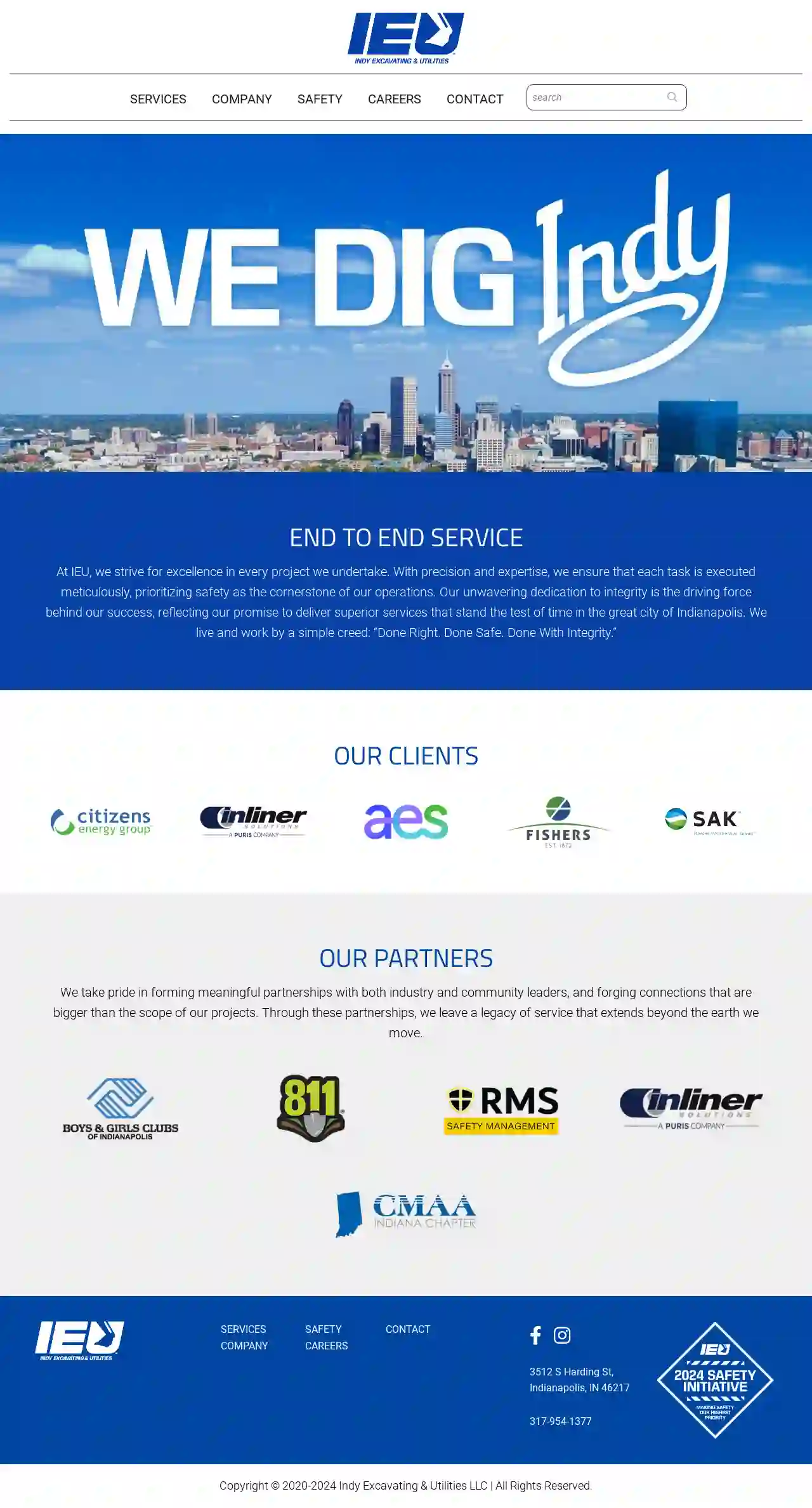Excavation Contractors Indiana
Best Land Excavation in Indiana
Get multiple Excavation Companies quotes for your project today! Compare profiles, reviews, accreditations, portfolio, etc... and choose the best deal.

Minix Construction Company
11990 North California Boulevard Suit 20 PMB 1135, Walnut Creek, 94596, USWelcome to Minix Construction Company. We are a Mass Excavation, Shoring and Dewatering Company. Servicing depths of 50 feet deep. Our company has been in business since 1982, providing quality work to the entire bay area.
- Services
- Why Us?
- Gallery
Get Quote
Pat Mc Graw Excavating
1Aurora, USAbout Us With over 20 years in business and hundreds of satisfied customers, Pat McGraw Excavating is your trusted partner for all your excavation needs. We service the Tri-State area with over 30 pieces of heavy equipment at our disposal, ensuring no project is too big for us.
- Services
- Why Us?
- Gallery
Get Quote- Is
Isch Excavating LLC
51 reviewsIndianapolis, US- Services
- Why Us?
Get Quote 
MacAllister Hydrovac
16300 Southeastern Ave, Indianapolis, 46203, USMacAllister Hydrovac: Your One-Stop Shop for Hydrovac Equipment MacAllister Hydrovac is your trusted source for all things hydrovac in Indianapolis, Indiana. We offer a comprehensive range of services, including new and used hydrovac sales, rentals, parts, and service. Our team of factory-trained technicians is dedicated to keeping your equipment running smoothly and efficiently. Why Choose MacAllister Hydrovac? Reliable Equipment: We offer a wide selection of high-quality hydrovac equipment from leading manufacturers. Expert Service: Our technicians are highly trained and experienced in all aspects of hydrovac equipment. Convenient Solutions: We offer a variety of rental and purchase options to meet your specific needs. 24/7 Support: We're available to assist you with any emergency repairs or maintenance needs. Our Services Hydrovac Rentals: Rent the equipment you need for short-term projects. Hydrovac Service: Keep your equipment running smoothly with our expert maintenance and repair services. New and Used Hydrovac Sales: Purchase new or used hydrovac equipment to meet your long-term needs. RIG360 Truck Center: Get professional truck and diesel engine service for a wide range of makes and models. Contact Us Today Whether you need to rent, buy, or service hydrovac equipment, MacAllister Hydrovac is here to help. Contact us today to learn more about our services and how we can meet your needs.
- Services
- Why Us?
- Gallery
Get Quote
Indy Excavating & Utilities
3.76 reviews3512 S Harding St, Indianapolis, 46217, USAbout Indy Excavating & Utilities LLC At IEU, we strive for excellence in every project we undertake. With precision and expertise, we ensure that each task is executed meticulously, prioritizing safety as the cornerstone of our operations. Our unwavering dedication to integrity is the driving force behind our success, reflecting our promise to deliver superior services that stand the test of time in the great city of Indianapolis. We live and work by a simple creed: “Done Right. Done Safe. Done With Integrity.” We take pride in forming meaningful partnerships with both industry and community leaders, and forging connections that are bigger than the scope of our projects. Through these partnerships, we leave a legacy of service that extends beyond the earth we move.
- Services
- Why Us?
- Gallery
Get Quote
Sheads Excavating llc
54 reviewsIndianapolis, USSheads Excavating: Your Trusted Partner for Quality Excavation Services Sheads Excavating is a family-owned and operated business serving the greater Indianapolis communities, including Hendricks, Hamilton, Marion, Boone, Morgan, Johnson, Shelby, and Hancock counties. We take pride in our commitment to quality and customer satisfaction, treating every project with the utmost respect. Our team of experienced professionals is dedicated to providing you with the best possible service and experience. We believe that "pride produces quality," and our work reflects this dedication. We are known for our expertise in a wide range of excavation services, including: Finish grading and seeding Exterior drainage (French drains, drainage tile, culverts, sloping of grade) Retention pond repair (Hendricks County's premier provider!) Trenching Driveway and pad stone installation Erosion control And many more unique services At Sheads Excavating, we are committed to providing our clients with the highest level of service and expertise. We are dedicated to exceeding your expectations and delivering exceptional results on every project. Contact us today to discuss your excavation needs and let us show you the Sheads Excavating difference.
- Services
- Why Us?
Get Quote- Pe
Performance Underground, LLC.
1Indianapolis, US- Services
- Why Us?
Get Quote - Gr
Greenwald Enterprises Inc
2.45 reviewsIndianapolis, US- Services
- Why Us?
Get Quote - G.
G.E. Marshall Inc.
4.715 reviewsIndianapolis, US- Services
- Why Us?
Get Quote - Am
American Construction & Excavating LLC
1Indianapolis, US- Services
- Why Us?
Get Quote
Over 21,512+ Excavation Pros on our directory
Our excavation companies operate in Indiana & surroundings!
ExcavationHQ has curated and vetted Top Excavation Companies near Indiana. Find a reliable business today.
Frequently Asked Questions About Excavation Contractors
- Clear the Area: Remove any obstacles, including vehicles, outdoor furniture, landscaping features, or structures, from the excavation zone and surrounding area.
- Mark Existing Features: Identify and mark underground utilities, septic tanks, sprinkler systems, or other buried elements you want to protect.
- Protect Landscaping: Use tarps or fencing to shield trees, shrubs, gardens, or other landscaping elements from damage.
- Provide Access: Ensure the excavation contractor has clear access to the work area, including gates wide enough for equipment.
- Discuss Logistics: Coordinate with the contractor regarding parking arrangements, material delivery, and any special instructions or concerns you might have.
- Sloped Property: Your property has a significant slope, making it prone to soil erosion or landslides.
- Creating Usable Space: You want to level off a sloped area to create a flat surface for patios, gardens, or other outdoor spaces.
- Preventing Damage: Erosion is threatening existing structures, driveways, or walkways.
- Landscaping Features: You're incorporating tiered gardens, raised beds, or other landscaping elements requiring soil retention.
- Planning and Surveying: Defining the excavation area, marking utility lines, and determining the required depth and grade.
- Site Preparation: Clearing vegetation, removing obstacles, and ensuring site accessibility.
- Excavation: Using appropriate equipment (excavators, backhoes, etc.) to remove earth and create the desired excavation.
- Hauling and Disposal: Transporting excavated material to designated disposal sites, complying with environmental regulations.
- Backfilling and Compaction: Refilling the excavation with suitable material and compacting it to achieve the required density and stability.
- Grading and Finishing: Leveling and shaping the surface to the final grade for landscaping or construction.
How do I prepare my property for excavation?
What is the difference between topsoil and subsoil?
Topsoil: The uppermost layer, typically rich in organic matter, nutrients, and microorganisms. It's essential for plant growth and is often darker in color.
Subsoil: The layer beneath the topsoil, containing less organic matter and generally denser. It provides support for roots but is less fertile than topsoil.
During excavation, topsoil is often removed and preserved separately for later use in landscaping, while subsoil is typically used for backfilling or other less demanding applications.
How do I know if I need a retaining wall?
What is the excavation process?
How do I prepare my property for excavation?
- Clear the Area: Remove any obstacles, including vehicles, outdoor furniture, landscaping features, or structures, from the excavation zone and surrounding area.
- Mark Existing Features: Identify and mark underground utilities, septic tanks, sprinkler systems, or other buried elements you want to protect.
- Protect Landscaping: Use tarps or fencing to shield trees, shrubs, gardens, or other landscaping elements from damage.
- Provide Access: Ensure the excavation contractor has clear access to the work area, including gates wide enough for equipment.
- Discuss Logistics: Coordinate with the contractor regarding parking arrangements, material delivery, and any special instructions or concerns you might have.
What is the difference between topsoil and subsoil?
Topsoil: The uppermost layer, typically rich in organic matter, nutrients, and microorganisms. It's essential for plant growth and is often darker in color.
Subsoil: The layer beneath the topsoil, containing less organic matter and generally denser. It provides support for roots but is less fertile than topsoil.
During excavation, topsoil is often removed and preserved separately for later use in landscaping, while subsoil is typically used for backfilling or other less demanding applications.
How do I know if I need a retaining wall?
- Sloped Property: Your property has a significant slope, making it prone to soil erosion or landslides.
- Creating Usable Space: You want to level off a sloped area to create a flat surface for patios, gardens, or other outdoor spaces.
- Preventing Damage: Erosion is threatening existing structures, driveways, or walkways.
- Landscaping Features: You're incorporating tiered gardens, raised beds, or other landscaping elements requiring soil retention.
What is the excavation process?
- Planning and Surveying: Defining the excavation area, marking utility lines, and determining the required depth and grade.
- Site Preparation: Clearing vegetation, removing obstacles, and ensuring site accessibility.
- Excavation: Using appropriate equipment (excavators, backhoes, etc.) to remove earth and create the desired excavation.
- Hauling and Disposal: Transporting excavated material to designated disposal sites, complying with environmental regulations.
- Backfilling and Compaction: Refilling the excavation with suitable material and compacting it to achieve the required density and stability.
- Grading and Finishing: Leveling and shaping the surface to the final grade for landscaping or construction.